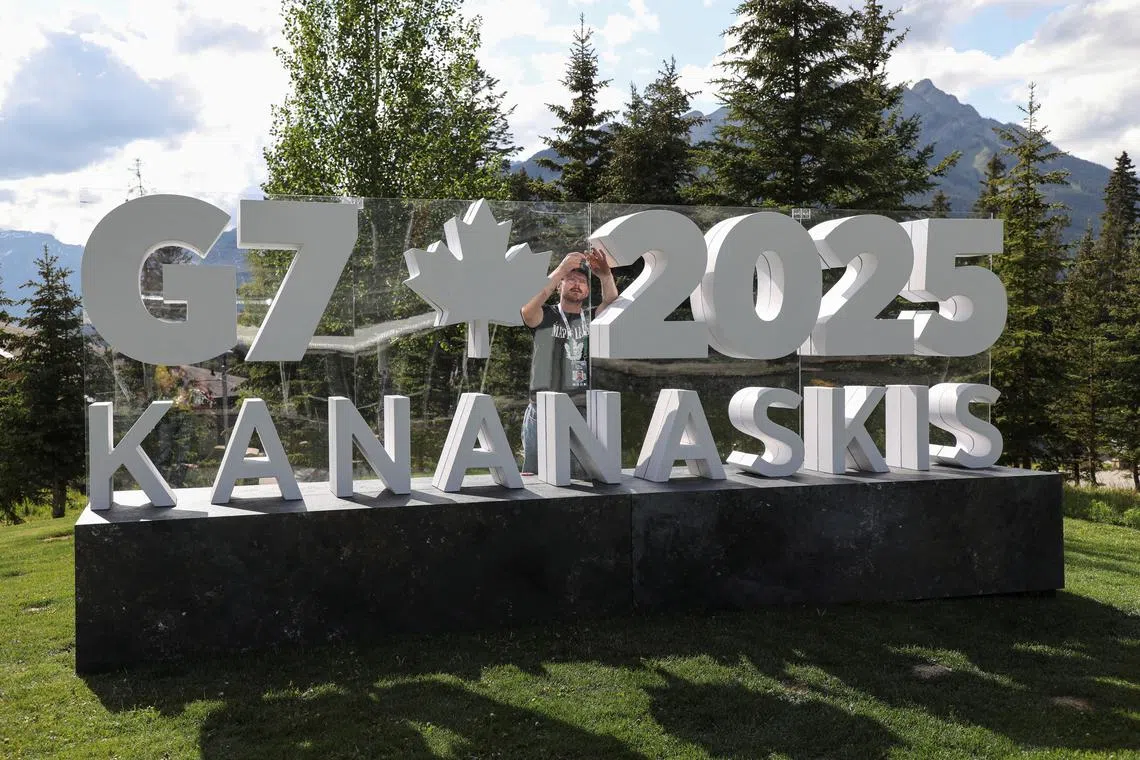G-7 leaders in Canada to discuss Israel-Iran conflict, hope to avoid Trump clash
Sign up now: Get ST's newsletters delivered to your inbox

Issues such as the US tariffs and conflicts in the Middle East and Ukraine are expected to feature heavily.
PHOTO: REUTERS
BANFF, Alberta - Group of Seven (G-7) leaders will gather in the Canadian Rockies starting on June 15 with the Israel-Iran conflict expected to be high on the agenda, while host Canada is striving to avoid clashes with President Donald Trump.
Canadian Prime Minister Mark Carney says his priorities are strengthening peace and security, building critical mineral supply chains and creating jobs. But issues such as US tariffs and the conflicts in the Middle East and Ukraine are expected to feature heavily during the summit. Israel and Iran launched fresh attacks on each other
German Chancellor Friedrich Merz told reporters his goals for the summit include for Iran to not develop or possess nuclear weapons, ensuring Israel’s right to defend itself, avoiding escalation of the conflict and creating room for diplomacy.
“This issue will be very high on the agenda of the G-7 summit,” Mr Merz said.
The summit takes place in the mountain resort of Kananaskis, some 90km west of Calgary.
The last time Canada played host, in 2018, Mr Trump left the summit before denouncing then-Canadian Prime Minister Justin Trudeau as “very dishonest and weak” and instructing the US delegation to withdraw its approval of the final communique.
“This will be a successful meeting if Donald Trump doesn’t have an eruption that disrupts the entire gathering. Anything above and beyond that is gravy,” said University of Ottawa international affairs professor Roland Paris, who was a foreign policy adviser to Mr Trudeau.
Mr Trump, who has often mused about annexing Canada, will arrive in Canada at a time when Mr Carney is threatening reprisals if Washington does not lift its import tariffs on steel and aluminum.
“The best-case scenario ... is that there’s no real blow-ups coming out of the back end,” said Mr Josh Lipsky, chair of international economics at the Atlantic Council think tank and a former White House and State Department official.
Mr Carney’s office declined to comment on how the Israeli strikes on Iran would affect the summit.
Diplomats said Canada has ditched the idea of a traditional comprehensive joint communique
A senior Canadian official told reporters that Ottawa wanted to focus on actions the seven members - Canada, France, Germany, Italy, Japan, the United Kingdom and the US - could take together.
Canadian Senator Peter Boehm, a veteran former diplomat who acted as Mr Trudeau’s personal representative to the 2018 summit, said he had been told the summit would last longer than usual to give time for bilateral meetings with the US president. Expected guests for parts of the June 15 to 17 event include leaders from Ukraine, Mexico, India, Australia, South Africa, South Korea and Brazil.
“Many will want to talk to President Trump about their own particular interests and concerns,” Mr Boehm said by phone.
Japanese Prime Minister Shigeru Ishiba hopes to persuade Mr Trump to drop trade tariffs that have imperiled Japan’s auto companies, following a sixth round of high-level trade talks in Washington on June 13.
A senior US official said on June 13 working discussions would cover trade and the global economy, critical minerals, migrant and drug smuggling, wildfires, international security, artificial intelligence and energy security. “The president is eager to pursue his goals in all of these areas including making America’s trade relationships fair and reciprocal,” the official said.
‘The big test’
Ukrainian President Volodymyr Zelensky’s visit to the White House
But diplomats say the frustration of dealing with the Trump administration has made some keener to assert themselves.
Canada has long been one of Ukraine’s most vocal supporters. Mr Trump came to power promising to end the war with Russia within 24 hours, but diplomatic efforts have stalled
One Ukrainian official involved in preparations for the summit said hope had faded for a strong statement in support of Ukraine. Instead, success for Kyiv would merely constitute an amicable meeting between Mr Trump and Mr Zelensky.
A European official said the G-7 summit and the Nato summit in The Hague later in June provide an opportunity to underscore to Mr Trump the need to press ahead with a sanctions Bill put together by US senators alongside a new European package to pressure Russia into a ceasefire and broader talks.
Mr Trump’s first international summit of his second term will offer some early clues on whether he is interested in working with allies to solve common problems, said Mr Max Bergmann, a director at the Centre for Strategic and International Studies.
“The big overarching question here is, basically, is the United States still committed to formats like the G-7? That is going to be the big test,” Mr Bergmann said. REUTERS


